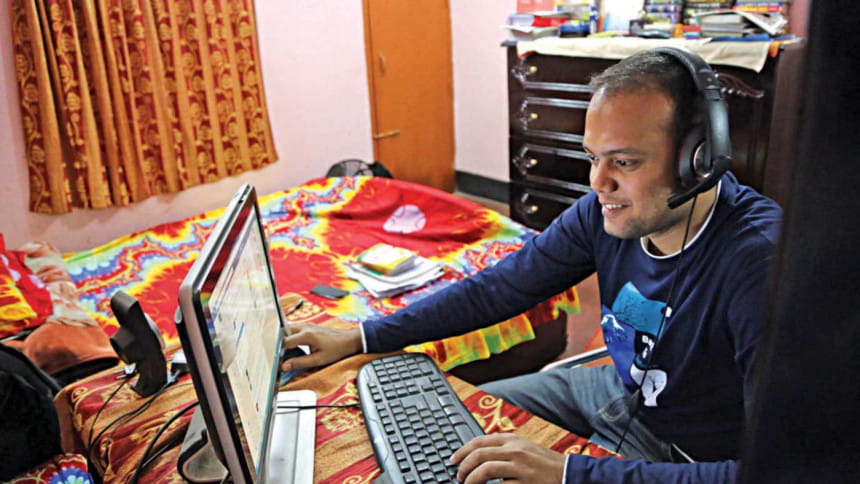BEING ALONE TOGETHER

Friendships are built over time, and increasingly we don't have enough. The world has speeded up, and so have we. Families are busier. Kids are overscheduled. It's the great paradox of the Internet age: The more connected we are, the less we get to know each other.
At home, each of us is in our own bubble, furiously connected to keyboards and tiny touch screens, texting and reading emails. The house is quiet, a quiet that does not ask to be broken. Hanging out with pals in the neighbourhood after school is passé. Who has time left for live people? We have sacrificed conversation for connection.
We have customised our lives—plugged-in lives—our OMG, LOL lives. At work, we lay out our suite of technologies: laptop, iPhone, iPad and another phone. And then we put our earphones on. We turn our desks into cockpits. Senior management keeps texting during board meetings. We go on Facebook while we are on a date. A friend tells me about an important skill he has learned: maintaining eye contact while he texts someone. It's hard but can be done with some practice, he says.
To some this may seem like a brilliant idea, but MIT psychologist Sherry Turkle thinks we are ending up hiding from one another, even as we are constantly connected to one another. “We are tempted to think that our little “sips” of online connection add up to a big gulp of real conversation. But they don't. E-mail, Twitter, Facebook, all of these have their places — in politics, commerce, romance and friendship. But no matter how valuable, they do not substitute for conversation.”

There is a stark distinction between traditional and online friendships. According to US Psychologist Jim Taylor PhD, “The former is about the quality of relationships and the latter is often about the quantity of relationships.”
In conversation we tend to one another with all our messiness. We can attend to tone and nuance. When we talk to someone, we are called upon to see things from his or her point of view. We clean all that up with technology. When we text, email and post on Facebook, we present a simulated version of ourselves. We can edit and delete. We can “unfriend” with a click. Over time we stop caring, we forget that there is a difference. There is a saying in the 1979 movie Alien: “In space, no one can hear you scream.” Well, in today's connected world, that could be modified to: In cyberspace, no one can hear you scream.According to researchers at California State University and UCLA, electronic communication may be making teens less interested in face-to-face communication with their friends. Face-to-face conversation unfolds slowly. It teaches patience. But connecting in sips—as Turkle calls it—doesn't work as well when it comes to understanding and knowing one another. When we communicate through digital devices, we expect faster answers and we dumb down our communications. The experience of the arc of the human life is lost.
“These days, social media continually asks us what's 'on our mind,' but we have little motivation to say something truly self-reflective,” Turkle, the MIT psychologist writes in the New York Times, “Self-reflection in conversation requires trust. It's hard to do anything with 3,000 Facebook friends except connect.”

We have embraced a new kind of 'reality' that accepts the simulation of compassion as sufficient. Think the bear-hug on Skype or the sad face on text. We seem increasingly drawn to technologies that provide the illusion of friendship without the demands of relationship.
We think constant connection will make us feel less lonely. “The opposite is true,” writes Turkle. “If we are unable to be alone, we are far more likely to be lonely. If we don't teach our children to be alone, they will know only how to be lonely,”
When we are alone, even for a few moments, we fidget and reach for our mobile phone. This constant, reflexive impulse to connect shapes a new way of being. In our rush to connect, we flee from moments of solitude, our ability to be our own selves and gather ourselves. Lacking that capacity, we turn to people but don't want to experience them as they are. We want spare parts of them—on Facebook, Twitter or text—to support our increasingly fragile selves. Have we lost the confidence that we care about each other?
We forget—in between texts and e-mails and Facebook posts—to listen to one another. But it is often in unedited, boring moments, moments in which we hesitate and stutter and occasionally go silent, that we reveal ourselves to one another.
“You've got to have friends,” Bette Midler famously sang. Research shows it's nice to have friends. Social fragmentation leads to social breakdown. Close communities have less crime, fewer problems. Well-connected people live longer.
Now, who can argue with that?

 For all latest news, follow The Daily Star's Google News channel.
For all latest news, follow The Daily Star's Google News channel. 



Comments